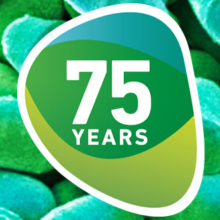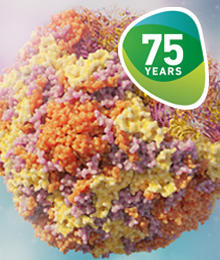Society launches new digital content hub on Understanding viruses and challenges in microbiology
06 July 2020

We are launching new collections of digital content for our anniversary, under the heading Why Microbiology Matters. The fifth of these digital content hubs is dedicated to Understanding viruses and challenges in microbiology.
Microbes are everywhere and affect almost all aspects of our lives. We cannot see them, but our world would not function without them. Bacteria, viruses, fungi, protists, archaea, algae and other microscopic life forms are on us and in us, in the air, soil and water, and in our food. They are in and on the surfaces of everything in our homes, workplaces and other environments. Most do not harm us, and many are essential for the good health of humans, animals and the planet.
In 2020 we celebrate the 75th anniversary of our founding with a year of activities dedicated to demonstrating the impact of microbiologists’ past, present and future – bringing together and empowering communities that help shape the future of microbiology.
In 2018, we launched a call to the community to nominate a discovery, event or activity that best highlights how microbiology answers big questions by giving us knowledge of very small things.
From the submissions received from throughout the microbiology community, we have created a series of digital content hubs, each examining an important theme in detail, including testimony from our members working in each area and a wealth of rich and interactive content. We will continue to add new content to the hubs as it becomes available, and each one will grow and be added to beyond our anniversary year, as a lasting resource for the microbiology community.
If you are interested in getting involved, please email [email protected].

Understanding viruses and challenges in microbiology: content brought together for the first time
The fifth in our series, Understanding viruses and challenges in microbiology, will examine the life cycle of pathogens and how they spread, the threat from emerging viruses, and how viruses are treated
Content will include:
- An explainer on how viruses can infect all forms of life, the emergence of novel pathogens and their impact on society and our environment, and the number of different methods that are available to treat certain viruses.
- Interviews and case studies from our members working on the innovative science involved in understanding viruses and how they can be treated.
- Resources available to explore – including some of the latest research on SARS-COV-2 in our Coronastream blog and how viruses are transmitted, podcasts on the emergence of parvovirus, explainer films and animations, and our membership magazine Microbiology Today, as well as a dedicated collection from our journals.
We invite the community and all those interested in understanding more about viruses to access this wide variety of content, brought together in one place for the first time.
Make sure you explore all five content hubs, each dedicated to a different and fascinating area of microbiology. We will keep updating with new content as it becomes available.
Celebrating the impact of microbiologists’ past, present and future
Other anniversary events and activities during our anniversary year include our microbiology images project, which highlights how microbiology answers big questions by giving us knowledge of very small things.
You can enjoy microbiology in literature by taking part in a book club. Inspired by Jo Verran’s Bad Bugs Book Club, we have released digital guidance on starting your own microbiology book club and understanding how public perception of microbiology is influenced by the representation of the discipline in books and films.
We have continued our work on our policy project ‘A Sustainable Future’, demonstrating the value and raising the profile of microbiology in addressing the world’s biggest challenges. View our case studies, which demonstrate the impact on three key areas where microbiology has large and interesting contributions to make: Antimicrobial Resistance, The Circular Economy and Soil Health.
Throughout 2020, we will convert our complete journal archive into the modern format, improving the visibility and reusability of our archive, and preserving our content for the long term.


